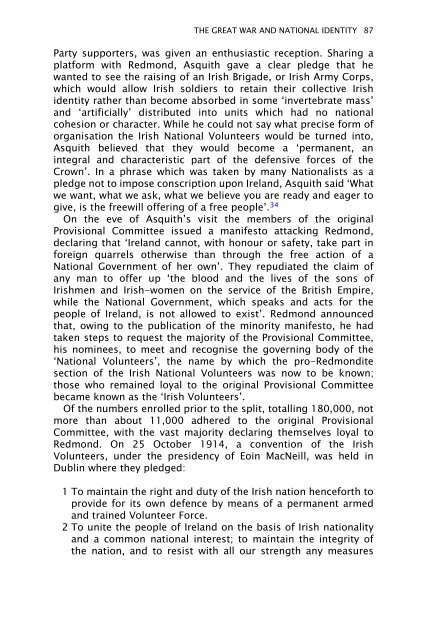Dividing Ireland: World War I and Partition
Dividing Ireland: World War I and Partition
Dividing Ireland: World War I and Partition
Create successful ePaper yourself
Turn your PDF publications into a flip-book with our unique Google optimized e-Paper software.
THE GREAT WAR AND NATIONAL IDENTITY 87<br />
Party supporters, was given an enthusiastic reception. Sharing a<br />
platform with Redmond, Asquith gave a clear pledge that he<br />
wanted to see the raising of an Irish Brigade, or Irish Army Corps,<br />
which would allow Irish soldiers to retain their collective Irish<br />
identity rather than become absorbed in some ‘invertebrate mass’<br />
<strong>and</strong> ‘artificially’ distributed into units which had no national<br />
cohesion or character. While he could not say what precise form of<br />
organisation the Irish National Volunteers would be turned into,<br />
Asquith believed that they would become a ‘permanent, an<br />
integral <strong>and</strong> characteristic part of the defensive forces of the<br />
Crown’. In a phrase which was taken by many Nationalists as a<br />
pledge not to impose conscription upon <strong>Irel<strong>and</strong></strong>, Asquith said ‘What<br />
we want, what we ask, what we believe you are ready <strong>and</strong> eager to<br />
give, is the freewill offering of a free people’. 34<br />
On the eve of Asquith’s visit the members of the original<br />
Provisional Committee issued a manifesto attacking Redmond,<br />
declaring that ‘<strong>Irel<strong>and</strong></strong> cannot, with honour or safety, take part in<br />
foreign quarrels otherwise than through the free action of a<br />
National Government of her own’. They repudiated the claim of<br />
any man to offer up ‘the blood <strong>and</strong> the lives of the sons of<br />
Irishmen <strong>and</strong> Irish-women on the service of the British Empire,<br />
while the National Government, which speaks <strong>and</strong> acts for the<br />
people of <strong>Irel<strong>and</strong></strong>, is not allowed to exist’. Redmond announced<br />
that, owing to the publication of the minority manifesto, he had<br />
taken steps to request the majority of the Provisional Committee,<br />
his nominees, to meet <strong>and</strong> recognise the governing body of the<br />
‘National Volunteers’, the name by which the pro-Redmondite<br />
section of the Irish National Volunteers was now to be known;<br />
those who remained loyal to the original Provisional Committee<br />
became known as the ‘Irish Volunteers’.<br />
Of the numbers enrolled prior to the split, totalling 180,000, not<br />
more than about 11,000 adhered to the original Provisional<br />
Committee, with the vast majority declaring themselves loyal to<br />
Redmond. On 25 October 1914, a convention of the Irish<br />
Volunteers, under the presidency of Eoin MacNeill, was held in<br />
Dublin where they pledged:<br />
1 To maintain the right <strong>and</strong> duty of the Irish nation henceforth to<br />
provide for its own defence by means of a permanent armed<br />
<strong>and</strong> trained Volunteer Force.<br />
2 To unite the people of <strong>Irel<strong>and</strong></strong> on the basis of Irish nationality<br />
<strong>and</strong> a common national interest; to maintain the integrity of<br />
the nation, <strong>and</strong> to resist with all our strength any measures








